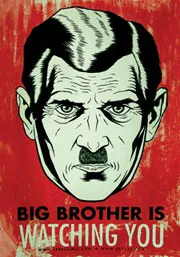There is a pervasive belief, seldom articulated or admitted, but inarguably embedded in public discourse, that we can achieve an ideal society if we just enact a few more laws and establish another bureaucracy to oversee our lives. This idea lies behind the rhetoric of most campaign speeches and special interest groups, and can be seen in every contentious topic. New prohibitions, regulations, and surveillance demands are always justified by sophistry.
Following the September 11th attacks, passage of the Orwellian PATRIOT Act, and the imposition of TSA security theater, a frequent argument went, "If you have nothing to hide, you have nothing to fear." My counterargument is, "if I have nothing to hide, why do you want to snoop into everything? My dignity as an individual requires privacy." Liberty is always violated when people are afraid, and liberty lost is rarely regained.
Another version of this belief is a general appeal to public safety. "We need to enact these new laws to stop criminals." The most eloquent counterargument to this assertion comes from the debate over the Clinton gun ban in 1994. A reference link from so long ago is hard to come by, and the Washington Times has a paywall for their archives. It is, however, generally attributed to Jeffrey R. Snyder in an article entitled Who's Under Assault in the 'Assault Weapon' Ban? Washington Times, August 25, 1994.
But to ban guns because criminals use them is to tell the innocent and law-abiding that their rights and liberties depend not on their own conduct, but on the conduct of the guilty and the lawless, and that the law will permit them to have only such rights and liberties as the lawless will allow.”
This same rebuttal applies to so many other matters. Civil Asset Forfeiture laws are used to steal money and property because the police argue it might be intended for buying and selling illegal drugs. Sweeping metadata and data collection has been justified by claims it helps fight terrorism. Random stop-and-frisk intrusions and many traffic stops are justified by claims it helps thwart crime with little (if any) supporting evidence. Licenses and permits are imposed because they allegedly protect the public. Know Your Customer (KYC) laws are thrust into our cryptosphere because the government says it needs to monitor money laundering and ensure compliance with its extortionary taxes. All of this is often accepted at face value because our education system builds on the mythology of state supremacy and government benevolence.
But is it true? We were three laws away from Utopia 100 years ago, and all we have achieved through all the legislation since then is a ballooning surveillance state with regulatory hurdles for every freedom we wish to exercise. Has it worked as promised? Does possible abuse of liberty by wrongdoers really justify impeding peaceable people every day, and even making them into "criminals" by legislative fiat if they fail to abide by myriad Byzantine rules?
Next time you find yourself questioning whether you should do some perfectly safe and reasonable thing because it might be "illegal," or you don't have the right papers filed, ask yourself why you still believe we live in a free country. Ask why you tolerate it. If it's because the risk of punishment outweighs the inconvenience, be honest with yourself, and then start discussing it with others. When you find yourself demanding new laws for "public safety," stop and question your own motivations and presumptions.

